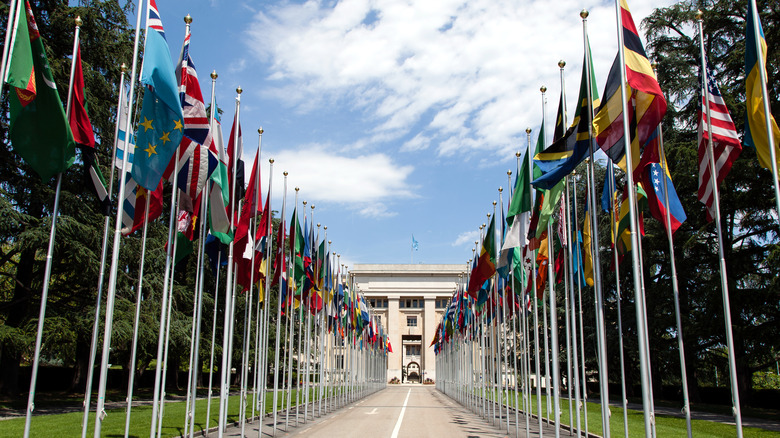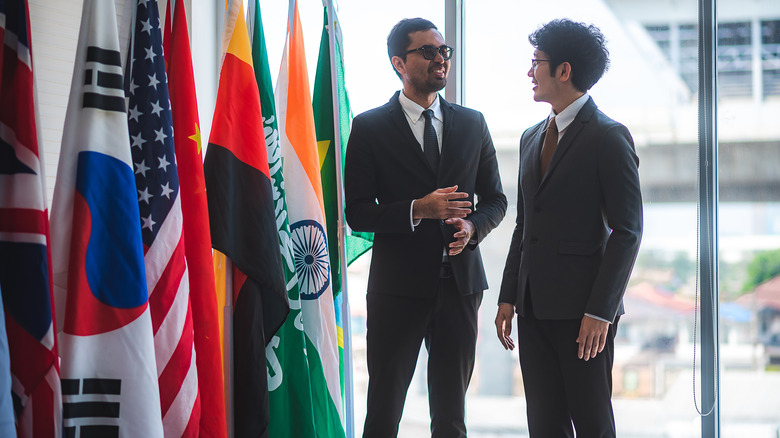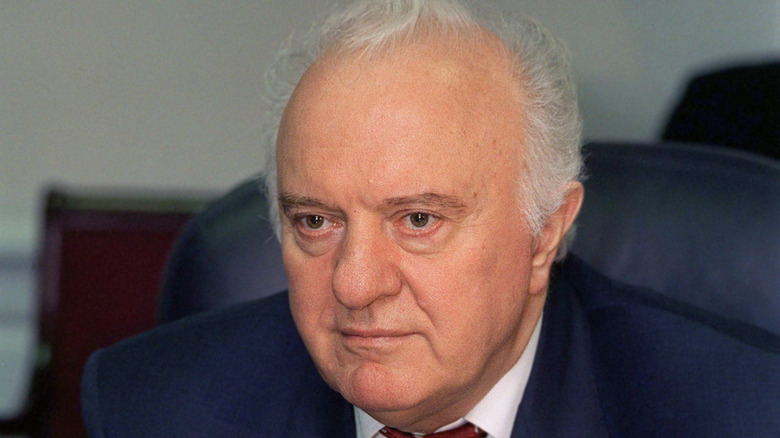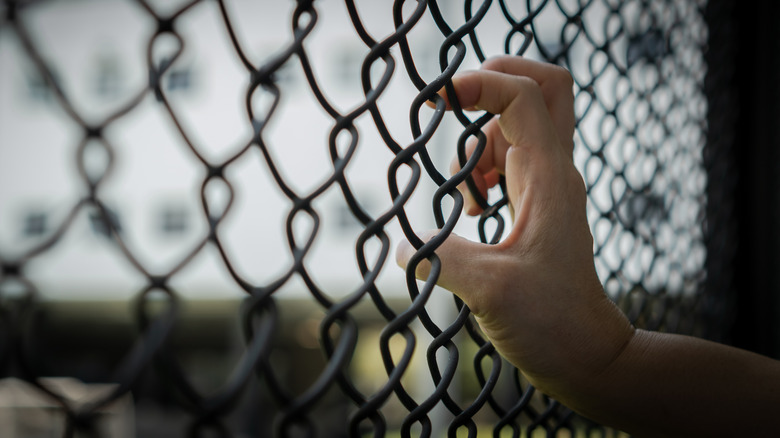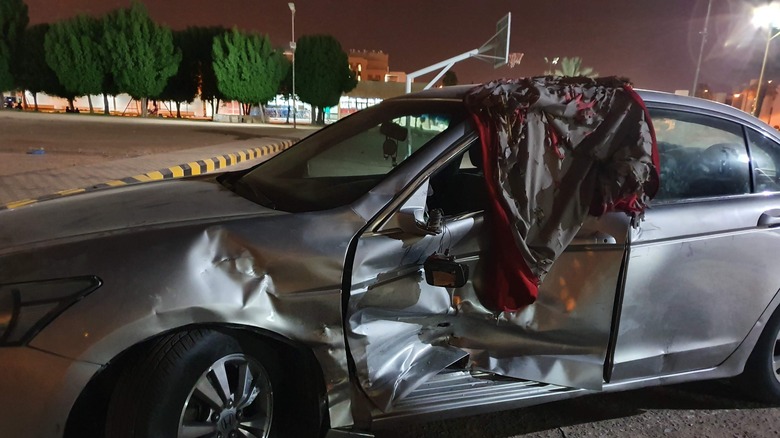Can Foreign Diplomats In America Really Commit Crimes?
Making sure governments are able to work with each other safely by using envoys and diplomats as go-betweens has been a common goal for countries since antiquity. Diplomatic immunity is one solution, since it ensures diplomats can perform whatever duties they must without fear of being arrested. On the other hand, diplomats throughout history have committed crimes due to the knowledge that they possess said immunity, and thus, can't be arrested in the first place.
Diplomats are subject to a vast series of procedures once they have committed a crime. Governments have the option to revoke the diplomat's immunity and leave them at the mercy of whatever government they were sent to. On the other hand, they might also stand by their diplomat, ensuring they are released. Overall, diplomatic immunity covers a broad range of actions, not to mention people, through its different levels. So, yes, diplomats can — with caveats depending on the situation — commit crimes in America. Therefore let's talk about the hows and whys of diplomatic immunity, as well as the types of crimes diplomats have committed.
The Vienna Convention on Diplomatic Relations
The Vienna Convention on Diplomatic Relations of 1961 codified modern law on diplomatic immunity and relations. It set out the rules for diplomats to act in regards to whatever their mission is, including avoiding harassment by local law enforcement or backing out of the mission completely. The convention justified these rules by way of what was functionally necessary for the diplomat, as opposed to the untested hypothetical justifications that had been used in the past, writes the Congressional Research Service.
According to the United Nations Audiovisual Library of International Law, the convention focused on compromises so that individual governments would be more likely to ratify the convention instead of opposing it on just one issue. There was plenty of discussion, for instance, over whether a diplomat's bag could be searched if it was suspected that it contained material not related to their official duties; ultimately, a compromise was reached stating that bags couldn't be held back or searched. Another inconsistent point had to do with what privileges were awarded to junior staff members, since, before the convention, some states had given them the same privileges as higher level diplomats, while other states gave less privileges. Ultimately, the convention came to a compromise on this issue as well. The U.S., however, didn't ratify the convention until 1972 (via Congressional Research Service). The Vienna Convention is now widely recognized as the standard in diplomatic relations.
Levels of diplomatic immunity
Diplomatic immunity has different levels depending on the diplomat's mission and rank. Whatever level of immunity a staff member has can influence what happens to them if they commit a crime while on foreign soil.
Diplomatic agents have the highest number of privileges, while service staff members only have certain privileges, such as official acts immunity. Official acts immunity means that a diplomat may be arrested, but if their act is described in the courtroom as being part of an official act, the case must be dismissed, writes the U.S. Department of State. Family members and domestic employees of diplomats have different levels of privilege as well.
Diplomats are granted safe travel with little chance of delays while performing official duties. However, according to ThoughtCo, they can still be sent out of the country they're working in. It should be noted, though, that the U.S. can be generous in regards to immunity for foreign diplomats, due to the vast number of United States diplomats serving in other parts of the world where conditions may be harsher. The U.S. aims to be gentler with diplomats so that their countries don't retaliate harshly with their own foreign ambassadors — namely, those from the United States.
Procedures for immunity
Though immunity might cancel out conviction in a criminal or civil court, there are procedures that may lead to different outcomes, such as being sent home or having an ambassador's immunity waived. Expulsion procedure, for example, requests that the diplomat be sent back to their home country, writes the U.S. Department of State; this is generally done in instances where an ambassador has committed a serious felony or violent crime and their home country has not waived their immunity.
According to Sky News, immunity depends in a large way on how close the job description of the diplomat is to that of an ambassador. Dealing in state secrets and intelligence pretty much guarantees that the diplomatic immunity will be water-tight. On the other hand, what happens after the crime also depends on individual circumstances; everyone's situation is different. Some diplomats may be immediately arrested and then released; some may not be arrested at all. The relationship between the country the diplomat is serving in and the country they are from also matters at the time. That said, once a diplomat claims the immunity they are entitled to, it oftentimes cannot be taken away (via Sky News).
Terrorist threats
In 2010, Qatari diplomat Mohammad al-Madadi smoked in an airport bathroom for a long time during a flight, causing a scare. He made a joke about using his shoes for a bomb, and he was arrested after the flight landed in Denver. He was later released and didn't face charges, writes CNN. Air marshals and the FBI did question al-Madadi about the incident, however. Due to a Nigerian underwear bomb threat the previous Christmas, airline officials had been on high alert for suspicious behavior of the type al-Madadi exhibited. They were concerned that al-Madadi could be another Richard Reid, otherwise known as the man who inadvertently forced the TSA to include removing shoes at airport security due to his bomb threat in 2001, writes CNN.
Al-Madadi was on official business and planned to visit college students in Colorado. It was also discovered that he was planning to visit al-Qaida member Ali al-Marri in Florence, Colorado, as part of a series of consular visits. According to NPR, al-Marri pleaded guilty in 2009 to conspiring to help fund a terrorist organization.
Slate writes that as the third secretary in Qatar, al-Madadi likely falls under the category of highly-ranked diplomats who cannot be arrested due to their status. Though the diplomat was arrested, he was quickly released, showing just how powerful his immunity was.
Murder
Though diplomats don't have a license to kill, murders have happened. In January 1997, the deputy ambassador to the U.S. from the Republic of Georgia, Gueogui Makharadze, killed a 16-year-old girl, Jovianne Waltrick, while driving around at midnight in Washington, D.C., writes ThoughtCo and CNN. Though authorities didn't issue Breathalyzer tests at the time due to Makharadze's status as a diplomat, they suspected alcohol was involved; the ambassador may have been going as fast as 80 miles per hour, according to CNN.
Makharadze was originally ordered to return to the Republic of Georgia before the president, Eduard Shevardnadze, altered his orders and required him to stay, writes CNN. The U.S. Secretary of State, Warren Christopher, interceded so that Waltrick's family could have some measure of justice. Ultimately, Makharadze's immunity was waived and he was put at the mercy of the United States court system. He ultimately served three years in a North Carolina prison before going home, writes ThoughtCo. The Georgian government also paid for Waltrick's funeral expenses and assisted her family further financially, to pay remunerations morally and ethically.
Physical abuse
With diplomatic immunity helping, some diplomats have gotten away with physical abuse. For example, in Washington, D.C., it is unknown how many diplomats abuse their servants, due to the protection of immunity, writes NPR. Many servants come with the diplomat and their family from their country of origin, and due to unknown knowledge of what happens behind closed doors, there may be much physical abuse. Due to not being citizens and with the families having immunity, there is little the U.S. government can do or even investigate, in contrast with U.S. abusers (via NPR).
Abuse can also come from within a family, as well. In 1988, a Zimbabwean diplomat's son was sent back to Zimbabwe under a foster family after he was discovered to have been abused by his father, according to AP News and the Washington Post. 9-year-old Terrence Karamba was originally placed in U.S. foster care after suspicious bruises were discovered while he was at school. However, his well-being quickly became the focal point in a tug-of-war between two major governments and his parents. After undergoing counseling and having a guardian appointed, Karamba was eventually sent home to Zimbabwe. His father, Floyd Karamba, an attache to Zimbabwe's U.N. mission, was sent away from the U.S. over the incident. However, the criminal charges were dropped due the attache's diplomatic immunity (via the Washington Post).
Vehicular crime
Vehicular crime can mean anything from driving drunk to hit and runs, and many diplomats have been noted for different driving offenses. NBC Washington did a deep dive into this issue, finding that hundreds of diplomats all over the Washington, D.C. area were pulled over for serious driving offenses, though they were often not prosecuted due to diplomatic immunity. A Yemeni defense attache was involved in a hit and run in Great Falls, Maryland, which happened to be three years after he had also been pulled over for reckless driving in Virginia.
The vast majority of diplomats were either pulled over for reckless driving or driving under the influence. From 2012 to 2014, 45 diplomats were sent home after repeat offenses, according to NBC Washington. Once they realized what they could get away with, some diplomats evidently felt no qualms in indulging again in their misbehavior. Further, certain files can also be covered up by the "classified" or "national security" labels, meaning there are more crimes on record than the public will ever know about.
Smuggling
Diplomats have been found to smuggle both goods and people, which is otherwise known as human trafficking. In 2011, human trafficking allegations with relation to diplomats shed light on whether the U.S. was doing enough to stamp out abuse. According to the Center for Public Integrity, Qatari diplomat Essa Mohamed Al Mannai was sued that March for trafficking four women who worked as domestic workers for him and his family — albeit working for extremely little pay and in awful conditions. The women were allegedly brought to the U.S. under fraudulent visas. They were promised work at $7.25 an hour and ended up working for as little as 55 cents an hour (via Center for Public Integrity). Sadly, human trafficking of this sort isn't new, and immunity means that diplomats get away with it more often than not.
Another smuggling case took place in April 1984, when a Bhutanese diplomat named Kunlay Wangdi was caught smuggling drugs into New York. He was carrying 56 pounds of cocaine separated into 23 smaller bags, dispersed throughout two suitcases, writes the New York Times. He flew through Bombay and Frankfurt before reaching New York. A counselor attached to the Royal Bhutan Foreign Service, Wangdi was not traveling for a diplomatic purpose at the time, so although he held a diplomatic passport, Wangdi did not have diplomatic immunity. He was subsequently held instead of paying his $5 million bail.
Financial crimes
United Nations officials in New York have accumulated $16 million in unpaid parking tickets. Diplomats are not forced to pay the tickets, so the money racks up. According to The Guardian, this isn't a problem just in the U.S.; Saudi Arabia's diplomats alone have accrued more than $140,000 Australian in Canberra, Australia.
Fines stretch back years and even decades, and it is difficult to actually track down who owes them. Fines have also risen dramatically in recent years due to the inclusion of congestion charge fees. The United States, despite debate, considers this fee a tax, and diplomats are exempt from paying taxes, so this is something they can, more or less, ignore.
Over the years, however, certain cities have made attempts at getting these fines down — or at least preventing them from rising higher. Stricter car registration policies might make some difference in the long run, but overall these large fines are here to stay due to how normalized the practice has become (via The Guardian). Diplomats are not required to pay, and they won't be arrested or otherwise disciplined for refusing either. The international community doesn't seem inclined to do either, particularly as such fines are usually not worth it for larger cities to bother about in the long run.
Family disputes
Many United Nations diplomats have child support that is owed but not paid. It can be difficult to track down said diplomats, considering they are immune from civil process and therefore must be served through diplomatic channels, writes City Journal. Finding personal addresses can be next to hopeless, and if said diplomat is serving internationally, international law makes everything even more confusing.
Before 1994, suing for child support was considered just about impossible. Now, thanks to a change in U.N. regulations, the vast number of cases implies that it can be done, but in reality, it's still very difficult. Kwadwo Nyamekye, a diplomat from Ghana, has an illegitimate American son whom he did not support monetarily for 15 years. The child's mother finally filed a petition for support in 1995, and Nyamekye agreed to pay a monthly amount. All the while, he had been benefiting from child and education credits.
Even after the agreement, according to City Journal, the diplomat didn't pay the agreed-upon amount, so the U.N. took money from his paychecks for child support. Even then, the organization was unsure where to send it and ended up sending it not to the mother or child but to the court who ruled the case in the first place. Family law is messy, even for diplomats and the United Nations.
Family members
Diplomatic immunity crosses over to apply to family members as well. A 12-year-old girl stabbed an older classmate multiple times while attending school at the British International School in Washington, D.C., in 2017, writes USA Today. Due to her parents' roles at the German Embassy, she was not arrested (via Patch). She was, however, detained after the stabbing incident. The injured teenager was brought to a hospital and survived the encounter.
According to the Washington Post, in January 1983, the son of a Saudi Arabian diplomat allegedly raped a 16-year-old girl in western Alexandria, Virginia. Due to diplomatic immunity, he was expelled from the U.S. almost immediately and sent home to Saudi Arabia, but no other punishment could be given by the State Department for his crime. The case was reported to the Saudi Embassy, which accepted the crime had happened. Regardless of whether or not he wanted to be sent home, the diplomat's son easily learned that the consequences wouldn't be harsh (and it's believed he returned to the U.S. some time later).
Espionage
Some diplomats are listed as diplomats, even if they're actually intelligence officers — otherwise known as spies. Since every government in the world has spies, many governments turn a blind eye to most actions — unless something obviously illegal happens, writes BBC. Even if some spies are caught and sent home, however, more will be waiting in the wings to take their places.
In February 2022, the U.S. government expelled 12 Russian diplomats for espionage-like activities, writes The Hill; diplomatic privileges were revoked in the process. Though the removal was apparently in-process for months, it did happen to fall just four days after Russia invaded Ukraine. In December 2021, the U.S. removed privileges from 27 other Russian diplomats, as well as their families. Nearly 100 other Russian diplomats were sent home between 2016 and 2018, partly due to suspected Russian interference in the 2016 election, and partly as the American response to the 2018 poisoning of Sergei Skripal, a former Soviet spy who had been living in the U.K.

